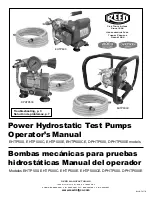
11
load, 5 Amps will flow and the supply will be in CV mode. As the voltage across the load is
increased, the power into the load increases until, at about 27V, the power limit is exceeded and
the supply changes from CV to UNREG.
Connection to the Load
The load should be connected to the positive (red) and negative (black) front panel OUTPUT
terminals. Both are fully floating and either can be connected to ground. Alternatively, on the
CPX200DP, connection can be made to the duplicate rear panel Output terminals, appropriate for
when the instrument is used in a rack.
When the rear panel Output terminals are used, the use of remote sense is always recommended
to ensure that output regulation is maintained within specification, see Remote Sensing section
below. If the rear panel Output terminals are used without remote sense make sure that the front
panel switch is set to LOCAL. Regulation will be degraded a little when local sense is used
because of the additional small voltage drop in the internal wiring to the rear terminals.
Remote Sensing
The instrument has a very low output impedance, but this is inevitably increased by the resistance
of the connecting leads. At high currents this can result in significant differences between the
indicated source voltage and the actual load voltage (two 10m
Ω
connecting leads will drop 0.2V at
10 Amps, for instance). This problem can be minimised by using short, thick, connecting leads, but
where necessary it can be completely overcome by using the remote sense facility.
This requires the sense terminals to be connected to the output at the load instead of at the
source; insert wires into the spring-loaded SENSE terminals and connect directly to the load.
Switch the LOCAL/REMOTE switch to REMOTE. To avoid instability and transient response
problems, care must be taken to ensure good coupling between each output and sense lead. This
can be done either by twisting the leads together or by using coaxially screened cable (sense
through the inner). Instability and poor regulation caused by noise on the sense leads when
connected to complex loads can be minimised by fitting a suitable capacitor directly between each
Sense terminal and its associated Output terminal at the PSU front panel. A polyester or low ESR
electrolytic with a value between 10uF and 100uF will generally be adequate.
The voltage drop in each output lead must not exceed 0.5 Volts.
Switch the LOCAL/REMOTE switch back to LOCAL when remote sensing is not in use.
When the rear panel Output terminals are used on the CPX200DP, the use of remote sense is
always recommended to ensure that output regulation is maintained within specification;
connections can be made to either the front or the rear remote sense terminals but never to both
pairs of terminals at the same time. Connect the Sense terminals to the load, following the
guidelines above, and set the LOCAL/REMOTE switch to REMOTE.
Series or Parallel connection with other units
The outputs of the power supply are fully floating and may be used in series with other power
supply units to generate high DC voltages up to 300V DC.
The maximum permissible voltage between any terminal and earth ground (
) is 300VDC; the
maximum permissible voltage between either terminal of one output and either terminal of the
other output on the same supply is also 300VDC.
WARNING!
Such voltages are exceedingly hazardous and great care should be taken to shield the
output terminals for such use. On no account should the output terminals be touched when the unit
is switched on under such use. All connections to the terminals must be made with the power
switched off on all units.
It should be noted that the unit can only source current and cannot sink it, thus units cannot be
series connected in anti-phase.
The unit can be connected in parallel with others to produce higher currents. Where several units
are connected in parallel, the output voltage will be equal to that of the unit with the highest output
voltage setting until the current drawn exceeds its current limit setting, upon which the output will













































